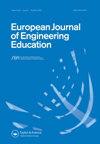结构不良的现实世界工程问题教学指南:从重新设计的工程项目管理课程中获得的见解
IF 2.8
Q2 EDUCATION & EDUCATIONAL RESEARCH
引用次数: 1
摘要
摘要现实世界中的设计环境可能是复杂的、结构不良的、开放的,并且通常对其目标和解决方案路径不确定和/或模棱两可。这项研究有助于理解如何在课程项目设置中处理这些类型的问题。该研究的主要目的是确定、提出和验证一套实用指南,用于处理设计工程或设计开发规划课程中结构不良、开放问题的项目作业。文献综述确定了提出指南的关键实践,然后通过干预工程项目管理硕士课程来验证这些实践。干预措施发生在新冠肺炎封锁限制期间,由105名注册学生组成了12个项目组。在验证过程中,从学生那里收集了定性和定量的反馈,结果为实现目标提供了积极的证据。这一结果的关键是学习的自我调节、学习的共同调节和社会共享的学习调节的结合。从这个意义上说,拟议的指导方针有望重新设计处理开放问题的大学课程,从而提高学生处理不确定性和歧义的能力。本文章由计算机程序翻译,如有差异,请以英文原文为准。
Guidelines for teaching with ill-structured real-world engineering problems: insights from a redesigned engineering project management course
ABSTRACT Real-world design settings can be complex, ill-structured, open and typically uncertain and/or ambiguous about their goals and solution paths. This study contributes to understanding how to work with these types of problems in a course project setting. The main objective of the study is to identify, propose and validate a set of practical guidelines for dealing with ill-structured, open-problem project assignments in courses that teach design engineering or design development planning. A literature review identifies key practices for proposing the guidelines, which are then validated by intervening in an engineering project management master’s course. The intervention took place during the COVID-19 lockdown restrictions with 12 project groups created from 105 enrolled students. During the validation, qualitative and quantitative feedback was gathered from the students, and the results provide positive evidence for achieving the objective. Key to this outcome was the combination of the self-regulation of learning, co-regulation of learning and socially shared regulation of learning. In this sense, the proposed guidelines look promising for redesigning university courses that deal with open problems, thus enhancing students’ capacity for handling uncertainty and ambiguity.
求助全文
通过发布文献求助,成功后即可免费获取论文全文。
去求助
来源期刊

European Journal of Engineering Education
EDUCATION & EDUCATIONAL RESEARCH-
CiteScore
7.30
自引率
13.00%
发文量
64
期刊介绍:
European Journal of Engineering Education is published six times a year in print and electronic editions and provides an essential forum for dialogue between researchers and specialists in the field of engineering education, at European and worldwide levels. European Journal of Engineering Education is the Official Journal of SEFI, the Socièté Européenne pour la Formation des Ingénieurs (the European Society for Engineering Education). SEFI is a non-governmental organization whose aims are to develop information about engineering education, to improve communication and exchange between professors, researchers and students and to promote cooperation between the various institutions concerned with engineering education.
 求助内容:
求助内容: 应助结果提醒方式:
应助结果提醒方式:


